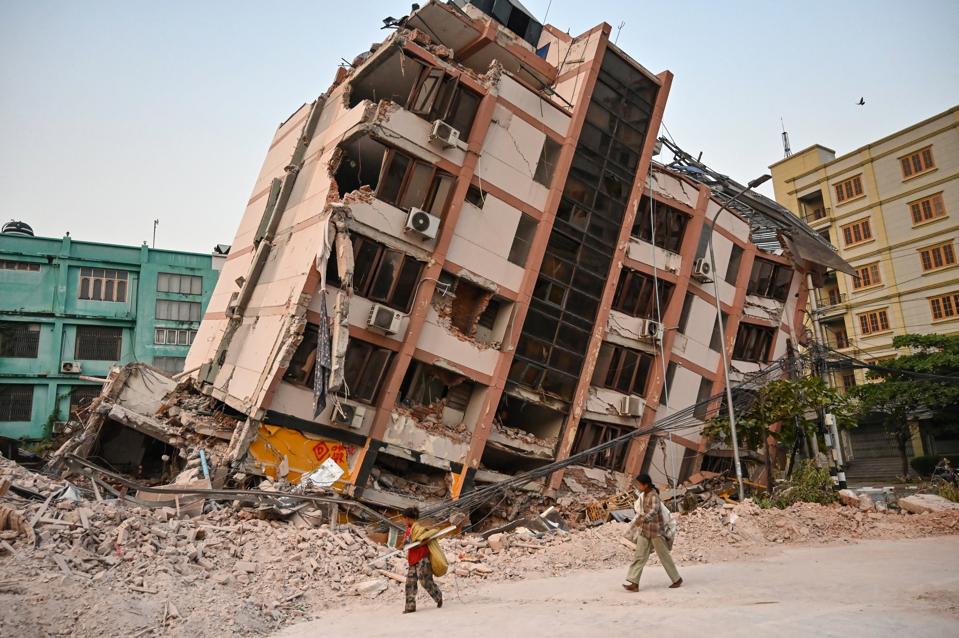When a 7.7 magnitude earthquake struck Myanmar on March 28, the epicenter was near the country’s second-largest city, Mandalay. The tremor collapsed buildings and killed an estimated 10,000 people. Roads and bridges buckled as the city lost power and water, with many newly homeless residents or people living in unstable buildings forced to live on the streets without access to sanitation as aftershocks continued to rock the region.
Somehow, the entire team and the Mandalay office of the nonprofit Lets Save the Strays International survived — to the immense relief of Massachusetts veterinarian Amy Shroff, VMD, the group’s founder and president.
“Our team is safe. Their families are safe. The feeders are safe. Most of the animals are safe,” she says. “It’s amazing that they’re safe.”
Working With Stray Animals
Despite some losing their homes and one veterinary clinic, the team is working overtime to help pets and people impacted by the earthquake and aftershocks.
Normally, Lets Save the Strays focuses on TVNR — aka Trap, Vaccinate, Neuter and Release — working to humanely trap stray dogs and cats, vaccinate them against rabies, spay or neuter them and, after a day or two of recovery, return them to their outdoor realm.
They’ll set up what’s essentially a veterinary MASH unit at schools, stadiums, police stations, hospitals, monasteries, universities and senior centers in response to requests for help. The team consists of five local veterinarians, several veterinary technicians, a bookkeeper, animal catcher and a “whole gaggle” of volunteers, with help from around 20 “street feeders” who feed strays out of kindness, Dr. Shroff says.
Since 2016, Lets Save the Strays has performed TVNR on nearly 20,000 dogs in Myanmar — around 600 dogs a month prior to the earthquake. Before that intervention, strays were being poisoned “by the truckload,” according to Dr. Shroff.
“I thought, ‘Why don’t we start doing TVNR ourselves and show the government and the community that it can work,’ and it’s exploded,” she says. “We started out small, but everybody wants it. People don’t want to poison them. And it really is One Health because by keeping animals healthy, we’re keeping the community healthy.”
Myanmar Earthquake Response
Since the devastating earthquake in Myanmar — which is also in the throes of a civil war — the Burmese team for Lets Save the Strays has shifted focus to offer free veterinary care, give away pet food and bottled water and vaccinate any animal brought in.
“It’s an amazingly difficult yet inspirational situation,” Dr. Shroff says.
She’s deeply concerned about the “major humanitarian crisis” in Myanmar.
“Myanmar is a country of very little resource, so there’s not a lot of infrastructure. It’s an older country. It’s in the middle of a civil war. The government is a military regime, which is constantly bombing and killing people in some of the areas of the country where active fighting is going on, and Mandalay is close to that active fighting,” she says. “And then you have an earthquake that just topples these older buildings and beautiful monasteries and pagodas — it is just absolutely horrible.”
So Lets Save the Strays is prioritizing helping pets to help the local people. Since March 30, the nonprofit has given away thousands of pounds of food for dogs and cats, and is providing veterinary care to 12-30 pets every day.
Earlier this week, the team traveled to an impoverished village near Mandalay where nearly 400 homes were lost in the earthquake to feed, vaccinate, deworm and treat pets for mange and other health issues, according to Dr. Shroff.
“People are having trouble feeding themselves and taking care of themselves so we can help them with their pets, which is sometimes the only thing that they have,” she says.
An emergency grant from the International Fund for Animal Welfare and donations of food from pet stores have helped fuel efforts, but she says financial donations are still desperately needed, and that even $5 goes a long way in Myanmar.
“I want people to know this crisis is still ongoing and it’s not going away anytime soon,” she says. “We need all hands on deck.”

